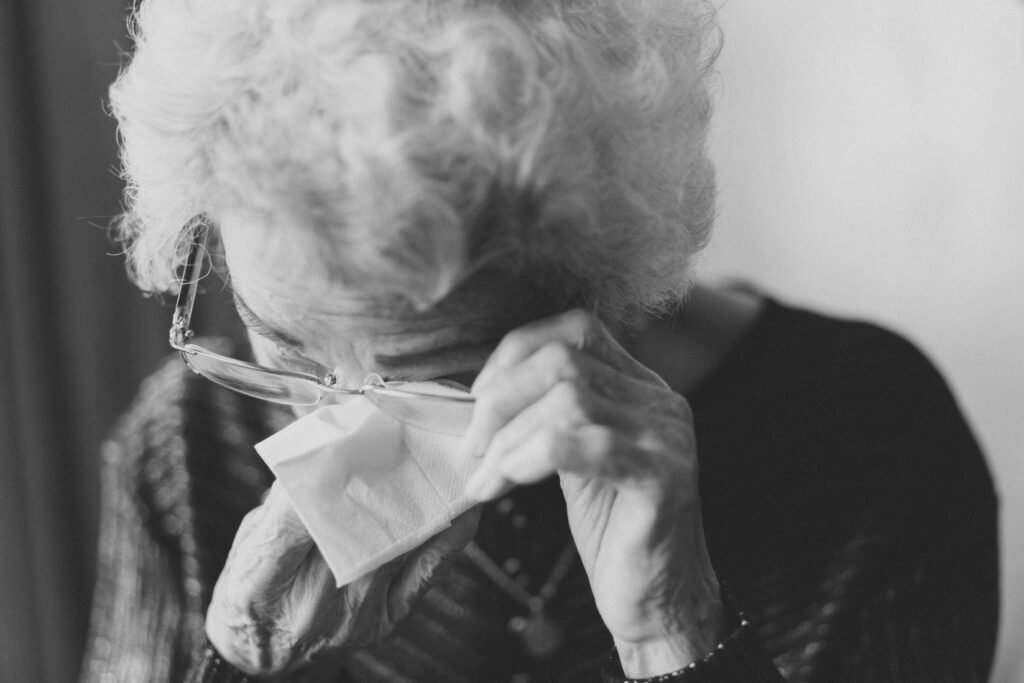March 2024
By Richard Fleming

Photo courtesy of Nikoline Arns
“Me, myself, and I” is a well-known expression. It first appeared in a classic 1937 Billie Holiday song written by Allen Roberts and Alvin Kaufman. The song’s first two stanzas are:
Me, myself and I
Are all in love with you
We all think you’re wonderful
We do
Me, myself and I
Have just one point of view
We’re convinced there’s no one else like you
Holiday’s song is powerful and heartfelt. The phrasing shows how deeply her emotions run. Every part of her is in love.
But there are other ways to understand the words “me, myself, and I,” especially when considering seniors. For us, these three pronouns are not simply different representations of the same thing. Rather, they can be seen as symbolizing the three dimensions in which seniors’ lives unfold.
Here is how I see it: “Me” means my physical body. “Myself” refers to my mind and what is going on inside my thick skull. And “I” represents how society views me.
Let’s look at each pronoun – each dimension of growing old – in turn.
First, me. Me refers to my body. This body is clearly growing older. Though I am lucky to have dodged some serious ravages of time, the corpus is deteriorating. Whether it be my joints or my muscles, my hearing or my vision, my metabolism or my skin, all have seen better days. Which aspects of physical decline I find most bothersome varies from one season to the next. This spring, I dislike how quickly my stamina fails me, how easily I grow tired. In the past, I could accomplish multiple projects with energy to spare. Not anymore. Even completing a couple of chores like watering the plants and cleaning the garage can require a time out. When summer comes, perhaps I will be more bothered by my declining hearing. Hopefully a hearing aid tuneup at Costco will help. By the time autumn arrives, my irritation may turn towards my knees getting stiffer. The slowing down of the human body affects all old folks, including me.
Next, myself. While my body is declining, my mind still lingers under the illusion I’m much younger. Some days I feel I’m in my early 40s. Other days I’m in my late 50s. Rarely do I think of myself as being in my 70s. The brain is funny that way. It can play tricks on us. We live our lives day by day, year after year, and we move forward through time. But our minds often fail to appreciate how far we have traveled and the toll it has taken. After spending five or six decades living vigorously and ignoring the prospect of growing old, it is hard to adopt a self-image of being gray haired, wrinkled, and slower of step. This disconnect between mind and body causes confusion and consternation as I move further into old age. Something does not seem right. My mind cannot fully grasp the reality of how many years I myself have lived on planet earth.
Lastly, I. This third pronoun puts focus on how society views me. When I am out in public, I am unmistakably viewed as a senior. And treated as one too. Often, when I’m in the hardware store, I’m the oldest person there. The clerks sometimes seem a bit surprised to see me foraging in drawers for the right sized screws I need for a home project. In the grocery, I am clearly viewed by young customers as a card-carrying member of the cohort of seniors shuffling down the aisles like a troupe of zombies. Though I feel no different than other customers, young folks are eager to briskly push past me. When I’m spending time deciding what type of pasta to purchase, youthful shoppers try not to show impatience as they quickly grab a box of organic whole wheat penne. And I can’t help but notice that young shoppers tend to avoid the checkout line I’m standing in, no doubt thinking I will have a hard time at the payment terminal, slowing things down interminably. No matter how young my brain feels, I find that society always treats me as an old person.
* * *
So “me, myself, and I” carries different meanings depending on one’s age. For the young, it serves as a statement of emphasis. For old folks, this trio of first-person pronouns can aptly characterize the complex levels on which we grow old: physical, mental, and social. Thus: Me. Myself. And I. The added periods are intentional.
With apologies to Billie Holiday, Allen Roberts, and Alvin Kaufman, I want to humbly offer a rephrasing of the first part of their song so it can appropriately be sung by an oldster:
Me. Myself. And I.
Are all in love with you
We all think you’re wonderful
We do
Me. Myself. And I
Have three points of view
For me, your love makes me young again
For myself, being with you makes my mind blossom anew
And I don’t care if society views us as two old turtle doves
Me. Myself. And I. We’re all convinced there’s no one else like you.
* * *
If you enjoyed this post, please consider subscribing to be notified of future posts. Subscriptions are free.
